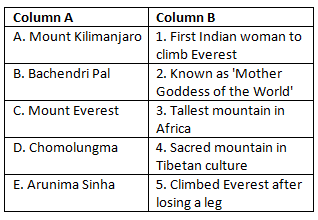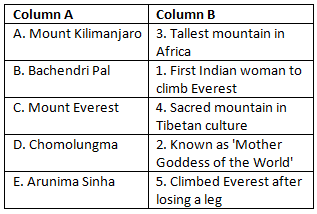Worksheet Solutions: Landforms and Life | Worksheets with Solutions for Class 6 PDF Download
| Table of contents |

|
| Multiple Choice Questions (MCQs) |

|
| Fill in the Blanks |

|
| True or False |

|
| Match the Following |

|
Multiple Choice Questions (MCQs)
Q1: What is a landform?
(a) A type of tree
(b) A natural feature on the Earth's surface
(c) A man-made structure
(d) A type of animal
Ans: (b) A natural feature on the Earth's surface
Q2: Which mountain is known as the highest peak in the Himalayas?
(a) Kanchenjunga
(b) Mount Kilimanjaro
(c) Mount Everest
(d) Mont Blanc
Ans: (c) Mount Everest
Q3: What type of farming is commonly practiced in mountainous regions?
(a) Terrace farming
(b) Aquaculture
(c) Urban farming
(d) Hydroponics
Ans: (a) Terrace farming
Q4: Which of the following is a characteristic of plateaus?
(a) They are always covered with snow
(b) They have a flat top
(c) They are lower than the surrounding land
(d) They are formed by erosion
Ans: (b) They have a flat top
Q5: What is the Tibetan Plateau commonly referred to as?
(a) The Roof of the World
(b) The Valley of the Gods
(c) The Desert of the East
(d) The Mountain Range
Ans: (a) The Roof of the World
Fill in the Blanks
Q1: A __________ is a natural feature on the Earth's surface, such as mountains or plains.
Ans: landform
Q2: The __________ is the highest mountain in South America.
Ans: Mount Aconcagua
Q3: __________ farming is practiced on steep slopes by cutting steps into the land.
Ans: Terrace
Q4: The __________ Plateau is known for its rich mineral resources.
Ans: Chhota Nagpur
Q5: The __________ is a large area of flat or gently rolling land.
Ans: plain
True or False
Q1: Mountains are always covered with snow.
Ans: False
Q2: The Himalayas are considered young mountains because they formed recently in Earth's history.
Ans: True
Q3: The Tibetan Plateau is the largest and highest plateau in the world.
Ans: True
Q4: Floodplains are formed by the deposition of sediments by rivers.
Ans: True
Q5: The term 'avalanches' refers to the sudden fall of rocks from a mountainside.
Ans: False
Match the Following
 Ans:
Ans:

FAQs on Worksheet Solutions: Landforms and Life - Worksheets with Solutions for Class 6
| 1. What are some common landforms found on Earth? |  |
| 2. How are landforms created? |  |
| 3. How do landforms affect the distribution of life on Earth? |  |
| 4. How do humans impact landforms and the environment? |  |
| 5. Can landforms change over time? |  |
















